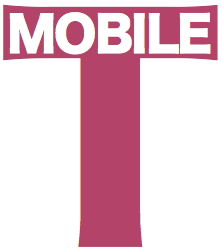 Why T-Mobile Needs a Chief Customer Officer shows how customers’ omni-channel interactions with enterprises demand profound integration of business processes, and how firms’ failure to “go all the way” in breaking down silos ultimately threatens business. Most firms don’t go far enough, including T-Mobile, and their silo-centric efforts fail to get the job done. To illustrate the point, I’ll share how T-Mobile alienates fans like me by not delivering what they promise.
Why T-Mobile Needs a Chief Customer Officer shows how customers’ omni-channel interactions with enterprises demand profound integration of business processes, and how firms’ failure to “go all the way” in breaking down silos ultimately threatens business. Most firms don’t go far enough, including T-Mobile, and their silo-centric efforts fail to get the job done. To illustrate the point, I’ll share how T-Mobile alienates fans like me by not delivering what they promise.
This story also shows that the need for a CCO is particularly acute in mature economies like the U.S.A. and Europe because their silos were built decades ago, and their legacy processes often adversely affect customer experience.
Chief Customer Officer: Just Another Fancy Title?
 At conferences and professional groups, I often end up introducing the concept of the CCO to people I meet. I founded the Chief Customer Office in 2015 as a way to empower people to understand the importance of the role.
At conferences and professional groups, I often end up introducing the concept of the CCO to people I meet. I founded the Chief Customer Office in 2015 as a way to empower people to understand the importance of the role.
The key rationale for the chief customer officer is that multiple silos within organizations affect customers’ perceptions of their interactions with the brand. This extends far beyond traditional customer-facing organizations like sales, customer service, marketing and retail. For example, warranty policies, return policies, various engineering teams, etc. The back end of the organization can have tremendous impact on customers without realizing it. Therefore, chief customer officers (CCO), once they have developed a customer transformation vision and strategy, add tremendous value when they engage ALL parts of the enterprise in developing empathy for how they affect customers and show each silo how to act on that empathy.
Until enterprises develop a comprehensive and continuous means for developing and maintaining empathy with their customers, they will underperform. When one silo becomes customer-focused, but it’s sabotaged by other silos that aren’t, its investment is wasted. This is the rule in most organizations today.
The Achilles heel of organization and silos is that, although they may increase efficiency due to their focus and best practices, they become focused on themselves, their operations, their results. They often appear inane to customers. The rule for organizations without CCOs is that their organizational problems become their customers’ problems. This is a major driver of customer churn and pressure on profit.
My Customer Experience with T-Mobile
T-Mobile is one of my favorite companies. I’ve been a customer for about 18 months, and I migrated my whole family over to them, away from AT&T.
I love T-Mobile because I find that they deliver good service with fewer gotchas, gimmicks and other low-trust things that plague the telecoms and cable business. On top of that, they have products/services that make sense to me. By contrast, AT&T forced me to call every year to get a new “promotion” because they increased the price of core services about 50% after a year.
 I’d been an AT&T customer since 1998; with two DSL lines, a home phone and a family plan with three mobile phones, I’d been spending over $3,000 a year with AT&T, and I’d become increasingly frustrated with their “promotion” game, so I tried the T-Mobile free trial. I didn’t want to change networks without knowing what the service would be like. So they loaned me a phone and I used it for a week. The data and voice quality was comparable to what I’d had with AT&T. T-Mobile had packages that were better suited to how I and my family used data, voice and texts, so I’d migrated myself, tried it for a month, and then migrated my family members. T-Mobile had paid my wife to get out of her AT&T contract, too.
I’d been an AT&T customer since 1998; with two DSL lines, a home phone and a family plan with three mobile phones, I’d been spending over $3,000 a year with AT&T, and I’d become increasingly frustrated with their “promotion” game, so I tried the T-Mobile free trial. I didn’t want to change networks without knowing what the service would be like. So they loaned me a phone and I used it for a week. The data and voice quality was comparable to what I’d had with AT&T. T-Mobile had packages that were better suited to how I and my family used data, voice and texts, so I’d migrated myself, tried it for a month, and then migrated my family members. T-Mobile had paid my wife to get out of her AT&T contract, too.
I’d also been frustrated with the poor DSL service AT&T had been delivering at home, so I dropped DSL and used my iPhone as a hotspot instead. I had 3G speed on my iPhone 4, and the AT&T DSL got the same speed, and the quality was the same. After I tried that for a month or so, I cancelled my family’s DSL and showed them how to do the same thing.
In sum, I am pretty much a raving fan of T-Mobile. They empowered me to downscale a bunch of services and costs I didn’t need, the quality of the network was comparable to AT&T, and they have proven themselves to be trustworthy and eager to help me. My family reports the same thing.
However… I’ve recently had a very frustrating experience with T-Mobile that I think illustrates why silos have to go.
How T-Mobile’s Silos Delivered Horrible Customer Experience
In mid-May, my mobile hotspot stopped working with no warning. It had been normal for it to disappear for a few minutes, kind of like a wifi outage, but it would return after a few minutes. Not this time. Keep in mind that my profession requires being online pretty much continuously. My home office is my principal office. So I got on Twitter. Note that my phone’s connectivity was normal; the hotspot tethers my laptop so it can be online. That was the service that broke.
 The Twitter CSR opened a ticket, promising to fix it within three days. That time came and went, so I got on Twitter to ask the status. It turned out that the CSR had given the ticket to a local engineering team when it was a national engineering team issue, so that’d be another three days. Notice those silos, too. At this point, in for a penny…
The Twitter CSR opened a ticket, promising to fix it within three days. That time came and went, so I got on Twitter to ask the status. It turned out that the CSR had given the ticket to a local engineering team when it was a national engineering team issue, so that’d be another three days. Notice those silos, too. At this point, in for a penny…
I helped the CSR out with a bunch of information about my phone. I kept emphasizing that the hotspot had worked for over a year and I’d made no changes on my phone. So, another ticket for the national team; I asked if they could escalate since I’d waited three days for the wrong team. No.
I tested the hotspot from different locations around the city in case that would teach us something. In some cases, the option to “set up” the hotspot (an error since it was already set up) was there in settings while it was gone in others.
The Twitter CSR then told me Engineering was in discussions with Apple about it. Then many days went by. I cycled through a stream of Twitter CSRs, who all promised they would resolve it (good intentions, but they were overpromising).
I volunteered to go to a store, so they could run some tests on the phone. At this point, the CSR said that the hotspot went AWOL after a T-Mobile network upgrade. So he agreed that’d be a good idea; at the store they could put my SIM into a different device and see if the hotspot would work. I went to a store, and it worked. This seemed to validate that the issue was my iPhone 4’s operating system, which was the latest available but Apple had stopped supporting some time back. We also validated that my wife’s hotspot had also stopped working (she also has an iPhone 4). The CSR kept thanking me for my ideas and assuring me they’d “get to the bottom of it.” They all encouraged me to contact them 24/7.
Since they kept changing CSRs, I had to update each new one.
Finally, I had a call scheduled with Engineering, but he missed the appointment. The Twitter CSR said he had no way to contact Engineering to see why they missed the appointment. We finally connected twice, a couple days apart, but no resolution. The Twitter CSRs kept assuring me that they’d resolve the problem.
So since there’d been no resolution and several promises made and broken, due to the unknowns their teams were encountering, I asked if they’d loan me a hotspot device to use in the meantime. NO! None available!
This issue is unresolved as of writing, and all T-Mobile has stopped contacting me. [In case you are interested in the blow-by-blow, here’s the tmobile_twitter_chat.]
Lessons Learned
My lessons learned have two main categories, organizational and personal.
Organizational Issues
Look at this long list of silos I’ve touched! And there are probably more I don’t know about. Twitter customer service has become my main go-to, so I got them working on it. I have called phone customer service, too. Here’s the cast as I know it:
- Product: Constant Pricing, Binge-on, Mobile Hotspot, Voice, SMS…
- Phone customer service: Cheerful, effective, little waiting and cooperative when I’ve called on the phone.
- Twitter customer service: My main touchpoint since I find interactions more convenient when I’m working; they usually triage and resolve issues and have great attitudes.
- Engineering: They handle extra-technical issues with networks, connectivity, service. In this tale, I touched local and national teams.
- Retail: Provide tech support with the phone, and some testing.
- Marketing: the Uncarrier, the promise, the personality, colors the overall experience context.
 For over a month, I have paid for a service they stopped delivering with no warning. I realize that I have an old phone, and I don’t expect T-Mobile to support it forever. I do expect them to notify me in advance of a planned outage. This issue likely affects thousands of customers, and testing would have revealed the problem. This is an organizational flaw.
For over a month, I have paid for a service they stopped delivering with no warning. I realize that I have an old phone, and I don’t expect T-Mobile to support it forever. I do expect them to notify me in advance of a planned outage. This issue likely affects thousands of customers, and testing would have revealed the problem. This is an organizational flaw.
 I can empathize with T-Mobile. I have been in high-tech since the 90s. I’ve advised global enterprises on digital transformation since then. I understand engineering issues and organizational complexity. But I have still paid for a service that stopped working, which has greatly inconvenienced me and my wife.
I can empathize with T-Mobile. I have been in high-tech since the 90s. I’ve advised global enterprises on digital transformation since then. I understand engineering issues and organizational complexity. But I have still paid for a service that stopped working, which has greatly inconvenienced me and my wife.
 The silos don’t talk to each other. Engineering holds the keys, and they are far too closed and inaccessible. They give me flashbacks to 1990s customer service.
The silos don’t talk to each other. Engineering holds the keys, and they are far too closed and inaccessible. They give me flashbacks to 1990s customer service.
T-Mobile has some of the best social media customer service I’ve experienced,  but they are making the mistake of not being fully empowered. This is a typical mistake firms make with social media customer service. Their cardinal sin has been mismanaging the expectation gap; they constantly promise things over which they have no control. I feel they were telling me what they thought I wanted to hear without knowing whether it was actionable. It blows my mind that they have not reached out to me with a status; I have learned in business that it’s best to own up to mistakes and level with customers. They have the ability to do this and have failed.
but they are making the mistake of not being fully empowered. This is a typical mistake firms make with social media customer service. Their cardinal sin has been mismanaging the expectation gap; they constantly promise things over which they have no control. I feel they were telling me what they thought I wanted to hear without knowing whether it was actionable. It blows my mind that they have not reached out to me with a status; I have learned in business that it’s best to own up to mistakes and level with customers. They have the ability to do this and have failed.
 No loaner gear. I feel that I had a collaborative approach; I tried to work with them as proactively as possible. I suggested that they loan me a hotspot device (they sell/rent these) in the meantime. I’m baffled at why the CSR said that they had none available. This stopgap would have taken the pressure off both of us.
No loaner gear. I feel that I had a collaborative approach; I tried to work with them as proactively as possible. I suggested that they loan me a hotspot device (they sell/rent these) in the meantime. I’m baffled at why the CSR said that they had none available. This stopgap would have taken the pressure off both of us.
 Retail and customer service at least had access to the trouble ticket, so they have some information sharing and omni-channel capability. Engineering needs to break its silo. I know this is a challenge culturally, based on other engineering cultures I’ve experienced. The tech graveyard is awash with engineering companies that had poor insight into customer experience, or even awareness. Exhibits: Motorola, Nokia, RIM, Blackberry…
Retail and customer service at least had access to the trouble ticket, so they have some information sharing and omni-channel capability. Engineering needs to break its silo. I know this is a challenge culturally, based on other engineering cultures I’ve experienced. The tech graveyard is awash with engineering companies that had poor insight into customer experience, or even awareness. Exhibits: Motorola, Nokia, RIM, Blackberry…
Personal Issues
T-Mobile broke my trust bond with them. I pay them every month to deliver a service, and my livelihood depends on their service. They stopped delivering without informing me, so I could plan to deal with my phone’s incompatibility with no interruption.
First class tech companies test and suss out their technology’s impact on customer experience. They warn their customers before the upgrade happens, so customers can act preemptively. T-Mobile lags in a tech governance process.
T-Mobile is making the mistake of overpromising and underdelivering. I hope their customer service teams learn and address this. Since I’ve pioneered experiential social media for over a decade now, client work has consistently shown that firms can trust customers to be reasonable. Most people want the straight answer. T-Mobile has yet to give me a straight answer. Even if they would have told me, “Hey, sorry, we’re not supporting iPhone 4 any more,” that would have been better than keeping me hanging.
Although my T-Mobile CSRs empathized with my experience, at the end of the day they have yet to address it. This is why they need a chief customer officer to lead the breakdown of all those silos. They have the ethos and attitude. They have the intention. They are failing to act on it fully.
I don’t take this experience personally. I know that thousands of other people are affected, too. It’s a shame because T-Mobile has created a culture in which they really seem to enjoy serving people. Here, their structure and organization are sabotaging their excellent work. A CCO can fix this.
Finally, silo-breaking is a competitive advantage. I know from client work in which I analyze customer behavior in ethnographic research of social media that all kinds of customers long for cohesive considerate interaction from firms, and ethos + process + tech enables omni-channel, seamless interaction. CCOs can spearhead it.
All my interactions with T-Mobile were pleasant and well intentioned. But that only goes so far. I am still without a hotspot. In the meantime, I’m the guy who takes his sleeping bag to Starbucks.
Afterward (Why Empathy Matters)
This saga began in mid-May, and I started the first ticket a week later (see pdf). After several weeks of promises and failure to deliver a solution, I bought a new phone. I spent $550 to get a service for which I’d paid and T-Mobile had failed to deliver. I had a business to run, and I had lost all faith in their various silos’ ability to deliver the service.
A full ten days afterward their last message, I received this self-congratulatory messages from the T-Mobile Twitter team:
Hi Christopher! My name is Nicole and I have been working with the amazing Byron in regards to your ticket # 22605022. I checked on things today and I see that our engineering team has closed your ticket. It looks like you got a new device with an updated iOS version and now things are working as they should be with your hotspot, is that correct? Hotspot is an awesome feature and I definitely want your device to be working 110%! [Nicole Hernandez Jun 15]
I have several problems with this.
 Personally it feels very fake (the “amazing” Byron did nothing for me).
Personally it feels very fake (the “amazing” Byron did nothing for me).- Engineering closed the ticket; apparently they are not committed to solving the problem on behalf of the hundreds or thousands of other users of iPhone4 among their millions of customers, including my wife.
- “Want your device working 110%.” Really? I heard nothing from them for ten days. These comments feel more and more like a script.
- Where is the empathy? I had to buy a new phone due to their ineptitude. Again, if they had just said that they had stopped supporting iPhone 4/tethering, that would have enabled me to make my choice much earlier; however, for several weeks, they encouraged me to hang in there, assuring me that they’d solve the problem. My wife still cannot tether, nor can any other iPhone 4 customer.
Customer Service vs. Customer Experience
Empathy is the difference between old-school customer service and fully addressing customer experiences. They need a CCO to take them up the empathy curve because it’s the core to building durable and profitable relationships.
This incident taught me that T-Mobile’s #MagentaFamily mantra is mere lipstick. Its old school customer service is well trained to a point but offers no true empathy. By no means do I feel poorly treated by T-Mobile; their customer service is some of the best I’ve experienced. But the “Magenta Family” slogan proved to be skin deep. Of course, I am interpreting its meaning when I say that I thought they were claiming something more.
“Family” implies you stick together, have each other’s backs. They completely failed to support me, and I had to spend several hundred dollars to get back the service they’d promised and failed to deliver.
Had I been advising T-Mobile, here’s how Nicole’s message would have sounded:
Hi Christopher! My name is Nicole and I have been watching the progress of ticket # 22605022. I checked on things today and it looks like you got a new device with an updated iOS version, is that true? If you did, I am so sorry you had to buy a whole new phone to get your hotspot back! I realize that my team has been promising that we could fix the problem for weeks now, and I see that you depend on the hotspot to run your business, so I can’t tell you how sorry I am. We really thought we could get it fixed, and we failed. Please let me know how you’re doing. We will do our best to make it up to you.
Please let me know how you are doing.
Empathy Is the Difference
T-Mobile’s old-school customer service is better than AT&T’s was, and their products are better. But “family” we are not. Family is not a slogan; it’s feeling, recognizing and advocating for customers’ experiences. Family is caring beyond the business process. They had all the data to reframe this incident as I tried to do above. They don’t have the awareness or training. Had she responded by owning their failure to deliver, that would have been a good start.
T-Mobile needs a chief customer officer to take them up the empathy curve and to bake it into all the silos. Until they do, their care is just pretty pink lipstick.

Leave a Reply
You must be logged in to post a comment.